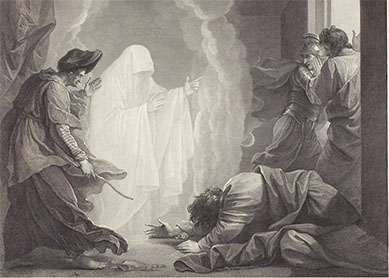In 1Sam 28:3-35, a woman who can communicate with the dead provides King Saul with a message from the Lord. Saul’s former guide, the prophet Samuel, had died in a previous scene (1Sam 3:20), but Saul needed Samuel’s advice as he faced hostile Philistine forces. Saul, however, faced a self-created dilemma: He himself had banned those who could communicate with the dead (1Sam 3:3)! So, he disguised himself and went to Endor to find a “medium” who could help him. The woman he sought there recognized Saul when she conjured Samuel, and Samuel became angry at being awakened from death. Making matters worse, this ghost of Samuel broke the news to Saul that “The LORD has turned from you and become your enemy” (1Sam 28:16). Although the focus is on Saul and Samuel, the woman at Endor plays a crucial role in this passage. She unwittingly facilitated news of Saul’s downfall; according to the Chronicler, Saul’s visit to her was itself part of his downfall (1Chr 10:13).
Who is the Woman at Endor?
The unnamed Woman at Endor, also known as the Witch of Endor or Medium at Endor, is identified by her location and one of her skills: calling upon and communicating with the dead. Endor was in northern Israel, near the southern tip of the Sea of Galilee. In getting to Endor from his outpost at Gilboa, Saul and his entourage had to travel uncomfortably close to the Philistine encampment at Shunem (1Sam 28:4). He must have been desperate to access this woman’s abilities to have made that perilous journey. The proximity to the Philistines may explain his need for a disguise (1Sam 28:8). Yet the Woman at Endor was apparently close enough to Saul’s usual domain that she knew of his prohibition of her kind. She resisted accommodating these strangers’ demands for her work (1Sam 28:9).
Is this woman a witch?
In verse 7, the woman is called an ov, a term that implies skill in some sort of arcane practice. Those identified as ov are rejected and subject to punishment by death in Leviticus (Lev 19:31; Lev 20:27). The KJV translates ov as “one with familiar spirits;” NRSV renders it “medium.” No matter the terminology, her activity here is clearly communication with the dead. Other biblical references banning this activity suggest that there were other ancient women who fulfilled such a role. However, this woman possesses none of the typical powers contemporary culture associates with witches (e.g., flying, creating potions, casting spells); it therefore would be anachronistic to consider her a witch.
The Woman at Endor possesses valuable traits aside from her ability to communicate with the dead. She was courageous. Saul’s prohibition of mediums means that she puts her life at risk when she practices her trade. She proceeds only after being reassured—with a swear—that she will not be punished for bringing answers to the living from beyond the grave (1Sam 28:9-10). With her ability to conjure the dead, the woman at Endor had the power to spiritually guide the community, even though she had to break the law to do so. She was not simply a banned outsider; she was a highly sought-after leader. In the context of Saul’s narrative, the Woman at Endor seems to be an outlaw in enemy territory; nonetheless, she possesses the ability to communicate a crucial prophetic message from the Lord to Saul.
Finally, the Woman at Endor prepared a generous meal for Saul and his companions, and implored the devastated Saul to eat (1Sam 28:21-25). Why did she provide a meal for this man who deceived her? Perhaps she responded out of fear, cultural convention, royal protocol, genuine kindness, or as means to an end to get the royal entourage to leave. Maybe this meal indicates a quality of forgiveness that overrides her anger at Saul’s deceit.




